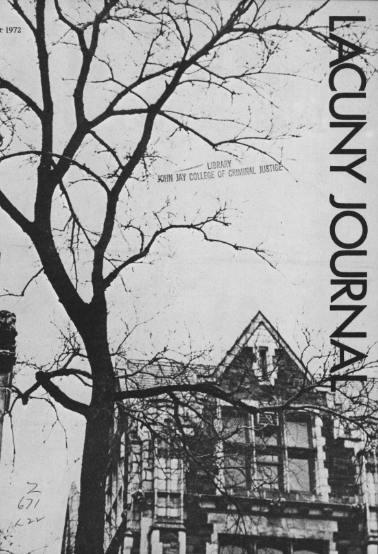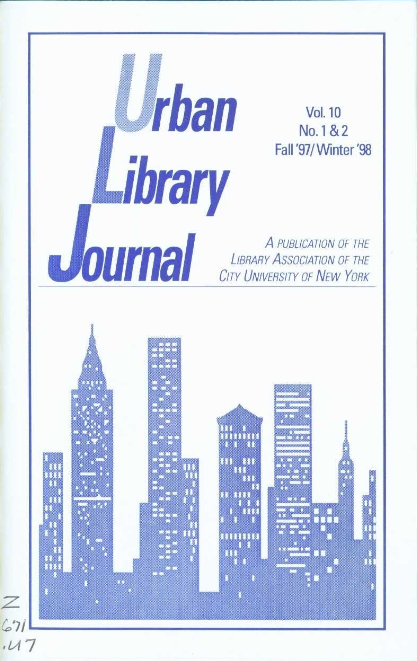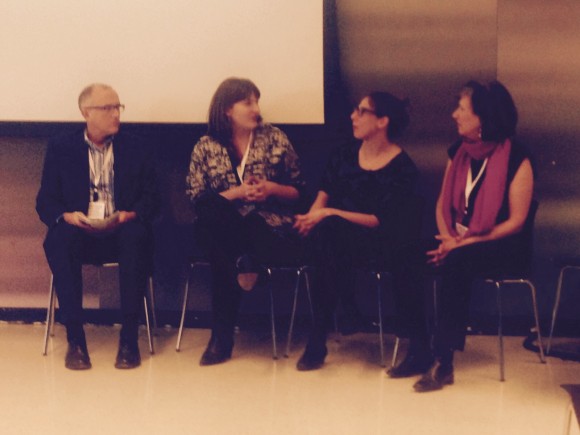Home » Articles posted by Megan Wacha (Page 3)
Author Archives: Megan Wacha
Urban Library Journal launches in Digital Commons
The Office of Library Services is thrilled to announce the launch of Urban Library Journal on Academic Works’ Digital Commons platform. Published by the Library Association of the City University of New York (LACUNY), Urban Library Journal (ULJ) fills a gap in LIS scholarship by addressing the work of libraries and librarians in an urban setting.
Before it was Urban Library Journal
 In 1972, LACUNY launched its first journal, LACUNY Journal, as a means to make “the ideas of CUNY librarians known to each other and to colleagues in other departments of City University.” The Editorial Committee hoped to address a full range of subjects and perspectives – including controversial ones – in order to promote a free and open exchange of ideas and raise the professional goals of its membership. And it did just that. From profiles of CUNY libraries and librarians to articles about the relationship between libraries and open admissions to questioning the role ACRL plays in bringing libraries together, Volume 1, Issue 1 was a platform for the diverse voice, experiences, and perspectives present throughout CUNY Libraries.
In 1972, LACUNY launched its first journal, LACUNY Journal, as a means to make “the ideas of CUNY librarians known to each other and to colleagues in other departments of City University.” The Editorial Committee hoped to address a full range of subjects and perspectives – including controversial ones – in order to promote a free and open exchange of ideas and raise the professional goals of its membership. And it did just that. From profiles of CUNY libraries and librarians to articles about the relationship between libraries and open admissions to questioning the role ACRL plays in bringing libraries together, Volume 1, Issue 1 was a platform for the diverse voice, experiences, and perspectives present throughout CUNY Libraries.
In 1981, the LACUNY Journal was replaced by the Urban Academic Librarian, which expanded its scope and the conversation beyond CUNY, to librarians working in an urban academic setting. Michael O’Donnell, Chairperson of the LACUNY publications committee and a librarian at the College of Staten Island, introduced the first issue of this new publication with a call for change:
As the 1980s unfolded, urban academic librarians need to redefine their mission in order to achieve a balance between the academically desirable and the fiscally and physically feasible. By rejecting both the starry-eyed idealism of the Sixties and the “looking-out-for-number-one” cynicism of the Seventies, perhaps we can establish realistic and achievable goals. We hope this journal will help provide a free exchange of ideas.
Launch of Urban Library Journal
I n changing the name to Urban Library Journal in 1998, the members of the LACUNY publications committee opened the journal to all librarians working in an urban environment. The city, its institutions, and its people were under attack from politicians, their policies and their budgets. Editor Rolando Perez introduced the first issue under the journal’s new name by addressing the importance of its expanded scope:
n changing the name to Urban Library Journal in 1998, the members of the LACUNY publications committee opened the journal to all librarians working in an urban environment. The city, its institutions, and its people were under attack from politicians, their policies and their budgets. Editor Rolando Perez introduced the first issue under the journal’s new name by addressing the importance of its expanded scope:
“No true American lives in New York City,” commented Ronald Reagan while in office — a comment that though easily dismissed did set the tone for a certain attitude towards our cities. . .
This attitude, though somewhat tempered in the 90s, still domineers a lot of federal, state, and even local politics with respect to our cities. And though no politician today would make the same statement made by Reagan almost twenty years ago, a lot of the legislation that impact upon our cities, does reflect the unstated attitude of our politicians. It is reflected in the way our public education institutions have come under rhetorical and economic attack, it is reflected in the lack of funding for educational programs, and it is reflected in our elected officials’ attitudes towards the very institutions that support the cities, as for instance, our urban libraries.
As former co-editors Beth Evans and Sally Bowdoin note “shortly after the name change [to ULJ] the LACUNY publications committee began to recruit editorial board members outside of CUNY. In 2003, an advisory board of nationally recognized librarians, including E. J. Josey, University of Pittsburgh, James C. Welbourne, Enoch Pratt Free Library, and Neerejana Ghosh, New York School Library System, was established.”
ULJ became an online-only, open access publication in 2007 when it moved to the Public Knowledge Project’s Open Journal System. With this change, all urban librarians could not only submit to the journal, they could read it as well.
Urban Library Journal in Digital Commons

In moving to the Digital Commons platform, ULJ joins the larger Academic Works initiative at CUNY, or, to be more accurate, CUNY joins ULJ in the larger open access movement. It also marks the first journal to be published and supported by the Office of Library Services, a service we hope to grow in future years.
Under the leadership of editor Junior Tidal (City Tech), and with the deft support of web manager Valerie Forrestal (College of Staten Island), archived issues of ULJ dating back to 2007 have migrated to the new platform. As part of this process, Tidal and a LACUNY subcommittee comprised of Margaret Bausman (Hunter College), Mark Eaton (Kingsborough Community College), Charles Keyes (LaGuardia Community College), and Jessica Wagner (Baruch College) selected a new logo as part of a design contest hosted by Logosauce.com.
In addition to the visual redesign, ULJ worked with the Office of Library Services to make its policies and procedures more transparent to its readers and contributors. ULJ and the Office of Library Services thank the Journal of Librarianship and Scholarly Communication and its editors for providing permission to adapt its documentation.
The Office of Library Services is pleased to support Urban Library Journal as it moves forward, on its new home on Digital Commons.
New Feature: How does access to this work benefit you?
Open access advocates, myself included, often talk about public scholarship for the public good. Open access advances the pace of scientific progress, promotes interdisciplinary research and collaborations, and allows researchers to share their work with those who don’t otherwise have access to it. We’ve all had the experience of hitting a paywall, and it’s not hard to believe that members of our local and global communities do too.
The Budapest Open Access Initiative, regarded as one of three declarations that defined and shaped the movement, establishes the public good as the foundation for open access:
An old tradition and a new technology have converged to make possible an unprecedented public good. The old tradition is the willingness of scientists and scholars to publish the fruits of their research in scholarly journals without payment, for the sake of inquiry and knowledge. The new technology is the internet. The public good they make possible is the world-wide electronic distribution of the peer-reviewed journal literature and completely free and unrestricted access to it by all scientists, scholars, teachers, students, and other curious minds. Removing access barriers to this literature will . . . lay the foundation for uniting humanity in a common intellectual conversation and quest for knowledge.
But who is the Public? How does CUNY Academic Works benefit them? We want to know!
Working with the team at Digital Commons, the Office of Library Services set-up a new feature in Academic Works: a feedback form. PDF cover pages in select series now include a question: “How does access to this work benefit you? Let us know!” Readers that click the hyperlink are directed to a feedback form that asks for some basic information as well as permission to publicly share their comments.
Before rolling it out across the repository, this feature was tested on a collection of dissertations at the Graduate Center. Monthly usage reports let us know this content gets a lot of attention, but who is downloading and reading it? How does it contribute to the public good? I can’t tell you about each download, but I can now tell you how open, public access to “The Contributions of Earl “Bud” Powell to the Modern Jazz Style” benefit one person:
I am a 52 year old engineer who has been playing jazz piano since the age of 10. I am delighted to find this thesis about one of the most important jazz pianists of the 20th century. It includes the *incredible* transcription of “Strictly Confidential,” an amazing piano piece by legendary jazz pianist Bud Powell. I have been looking for a transcription for this piece my entire life, as it is far too complicated for me to hear with my basic ears…
This is the first of what I expect to be many stories that demonstrate the benefits of open access to the public. Future feedback will be relayed to campus repository administrators and posted to Open Access @ CUNY when permissions allow.
Academic Works at the CUNY IT Conference
The City University of New York’s 14th annual IT Conference was held at John Jay College on December 3rd and 4th. While a number of sessions addressed open access initiatives at CUNY, a few specifically highlighted the role of CUNY Academic Works as part of these efforts — from the preservation challenges presented by digital dissertations at the CUNY Graduate Center to the launch of a new open access journal devoted to the scholarship of teaching and learning in art history, Art History Pedagogy and Practice, that will be published in CUNY Academic Works.
On Friday afternoon, William Casari, Jill Cirasella, Miriam Deutch and Megan Wacha presented “Opening CUNY: Academic Works at Work.” This session introduced attendees to the repository initiative and discussed how opening content to the world impacts CUNY and its community, both local and global. In order to provide a sense of the range of content types collected by CUNY Academic Works, each speaker addressed a specific collection at their institution: dissertations at the Graduate Center, open educational resources (OERs) at Brooklyn College, the “Save Hostos” Gerald J. Meyer archival collection at Hostos Community College, and faculty research from across the entire City University of New York. Slides are available via CUNY Academic Works.

Woah, we’re halfway there
 When CUNY Libraries embarked on the trail to a more open CUNY, the Office of Library Services communicated three actionable goals for the first 18 months:
When CUNY Libraries embarked on the trail to a more open CUNY, the Office of Library Services communicated three actionable goals for the first 18 months:
- In 6 months, 50% of institutions will have at least one collection in the repository
- In 12 months, 100% of institutions will have at least one collection in the repository
- In 18 months, CUNY Academic Works will have 15,000 items representing diverse content types and disciplines
In just eight months since the goals were announced at the Academic Works kick-off this March, 100% of institutions have at least one collection in the repository, and (WOAH!) we’re already halfway to the 18 month goal. There are now over 7,500 items in CUNY Academic Works.
Open Trails
Back in November of 2011, the CUNY University Faculty Senate passed a Statement and Resolution on Open Access – a resolution which supported the establishment of a CUNY-wide open access institutional repository and which has been a guiding document in the development of that repository, from its collections policies to its mission and goals:
CUNY Academic Works is a service of the CUNY Libraries dedicated to collecting and providing access to the research, scholarship and creative work of the City University of New York. In service to CUNY’s mission as a public university, content in Academic Works is freely available to all.
CUNY Academic Works aims to:
- Provide centralized, public access to the scholarly and creative output of the students, faculty, and staff of the City University of New York.
- Promote research and collaboration within and between the twenty-four campuses that make up the City University of New York, as well as the larger public.
- Preserve the history and development of the City University of New York.
While the mission and goals of Academic Works are clearly stated, it’s understandable that the first steps to meeting them can feel a little uncertain. Therefore, in order to support the Libraries as we embark on the trail to a more open CUNY, the Office of Library Services communicated three actionable goals for our first 18 months:
- In 6 months, 50% of institutions will have at least one collection in the repository
- In 12 months, 100% of institutions will have at least one collection in the repository
- In 18 months, CUNY Academic Works will have 15,000 items representing diverse content types and disciplines
Sound familiar? OLS has been busy getting the word out about Academic Works since the kick-off this March, and, less than four months later, CUNY Libraries has met its first goal. In fact, we passed it. Thanks to the commitment and hard work of CUNY librarians, eighteen (count ’em, 18!) of twenty-four institutions have their first collections in the repository within four months. And these initial collections have us well on our way to meeting the 18 month goal; they include 2,500+ items spanning from traditional journal publications and monographs to data sets, student work, open educational resources, and archival collections that capture the history of the University.
CUNY enters the scholarly communication landscape at an exciting time. It’s a time that some find reminiscent of the wild west (and it certainly has its good, its bad, and its ugly), but it’s also a time in which CUNY has the opportunity to pioneer the way.


